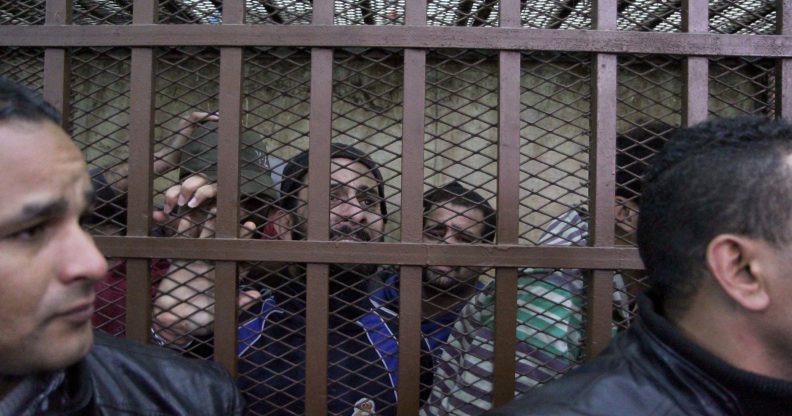Egyptian police are using Grindr to hunt and imprison queer people. Once behind bars, it only gets worse from there

26 men accused of ‘debauchery’ are detained in Cairo, Egypt (Hassan Mohamed/Anadolu Agency/Getty)
Fake dating profiles are being used by security forces in Egypt to entrap LGBT+ people and subject them to horrifying abuses in prison, a new report has found.
According to Human Rights Watch, the government in Egypt is specifically targeting the LGBT+ community using social media and apps such as Grindr to “clean the streets” of queer people.
The watchdog group accused police personnel and officers of Egypt’s National Security Agency of routinely picking up individuals off the streets and detaining them in inhuman conditions, often after illegally searching their phones.
Prosecutors use this content to justify prolonged detentions as they rubber-stamp police reports and bring unjustified prosecutions against them. Once in jail the victims are subjected to systematic torture and abuse, including forced “virginity tests”.
“Egyptian authorities seem to be competing for the worst record on rights violations against LGBT people in the region, while the international silence is appalling,” said Rasha Younes, LGBT+ rights researcher at Human Rights Watch.
One man, “Yasser”, 27, told the group he was arrested in Giza after chatting to a man on Grindr. “When they came back with a police report, I was surprised to see the guy I met on Grindr is one of the officers,” he said.
“They beat me and cursed me until I signed papers that said I was ‘practicing debauchery’ and publicly announcing it to fulfil my ‘unnatural sexual desires’.”
LGBT+ prisoners in Egypt describe being ‘water-hosed and tied up for days’.
Human Rights Watch shared detailed accounts from 15 separate people, including one from a 17-year-old girl, which reveal the horrific scale of physical and verbal abuse “ranging from slapping to being water-hosed and tied up for days.”
Political activist and trans woman Malak el-Kashif, 20, said she was arrested and “put in a cage-like cell” the size of a freezer after attending a protest in 2019. Security forces questioned her about her private life, her gender-confirmation surgery and her relationship with other activists, she said.
“I suffered the worst verbal abuse I have ever encountered by police officers and they forbade me from going to the bathroom for two days. They subjected me to a forced anal exam. They sexually assaulted me,” she said.
One victim was forced to stand for three days straight in a dark room with his hands and feet tied with a rope. Another detainee said police forced her to undergo three separate virginity tests, after which she “bled for three days and could not walk for weeks.”
Nine interviewees said police officers ordered other detainees to abuse them. Eight were victims of sexual violence while five were forced to undergo anal examinations.
Four said they were denied medical care, and eight said they were forced to sign confessions. All were denied access to lawyers.
The shocking report echoes the trauma of prominent LGBT+ activist Sara Hegazy, who took her own life three months ago after struggling with PTSD and depression caused by her torture in a Cairo jail.
“Prison killed me. It destroyed me,” she said after she escaped.
Her tragic suicide devastated the Egyptian LGBT+ community and sent waves of shock and solidarity worldwide. Candlelight vigils were held in cities from Brooklyn to Beirut to honour Hegazy and raise awareness of the struggle she faced.
Human Rights Watch is now calling on Egypt’s partners to “halt support to its abusive security forces until the country takes effective steps to end this cycle of abuse, so that LGBT+ people can live freely in their country.”

